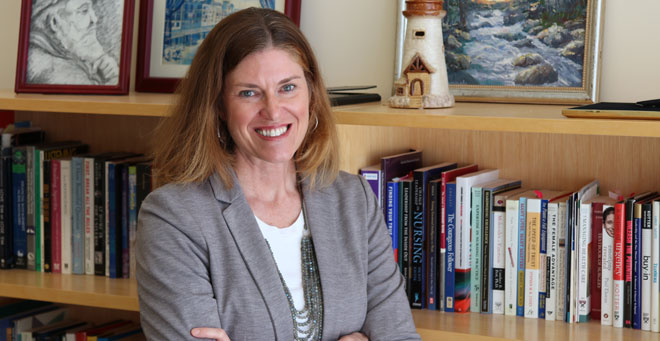 |
|
|
GSN class speaker Michele Griswold, MPH, RN |
Graduate School of Nursing 2017 class speaker Michele Griswold, MPH, RN, wants to identify, through research, underlying reasons that reduce opportunities for African American women to breastfeed their children—an opportunity that she had, and that she believes was largely due to not having experienced the same barriers African American women face.
“There are ethnic and racial differences in breastfeeding in the United States that reflect disparities in other areas of health,” said Griswold, who will receive her PhD at the UMass Medical School Commencement on Sunday, June 4. Even after studies adjust for education and income, African American women have lower breastfeeding rates compared with other groups. “My interest in research was prompted because we don’t really understand the reasons why.”
Griswold began her nursing career in oncology and critical care at what is now UMass Memorial Medical Center after earning her Bachelor of Science in nursing from Salve Regina University in 1989. The profound impact of a medical mission trip focused on maternal and child health in Guatemala changed her career trajectory several years later. Upon switching to labor and delivery nursing, she became increasingly aware of deep-seated historical and cultural precedents, as well as structural issues in society, that contribute to exceptionally low breastfeeding rates among African American women.
Her growing interest in public health led her to earn a Master of Public Health from Southern Connecticut State University. In addition to working as a certified lactation consultant in pediatric primary care, Griswold engaged in grassroots organizing as a founding member of the Connecticut Breastfeeding Coalition in 2001. She has worked as a lactation consultant in pediatric primary care since 2003, and is currently serving a two-year term as president of the International Lactation Consultant Association.
“Because I was very deeply involved in the lactation consultant profession, I had often heard colleagues speak about historical trauma and the impact that slavery has [had] on health outcomes today,” said Griswold. “Specifically, colleagues spoke about how enslaved women would be forced to nurse their enslavers’ children at the expense of their own.”
Today, African American women breastfeed at lower rates than women in other racial and ethnic groups in the United States. Noting that experiences of racism have been linked to poor health outcomes for decades but have not been extensively investigated in the context of breastfeeding, Griswold explored the association between experiences of racism and breastfeeding initiation and duration for her dissertation.
Analyzing 10 years of data collected by Boston University’s Black Women’s Health Study, she concluded that experiences of institutionalized racism influenced breastfeeding initiation and duration. Some interventions may reduce harmful effects of racism at an individual level, such as culturally appropriate support to help cope with stress, but interventions at a societal level are critical to close the gap of racial inequity in breastfeeding rates in the United States.
“Breastfeeding is widely viewed as something women have complete individual freedom of choice over, but the reality is that while the majority of women are choosing to breastfeed, the majority of those who do also stop before they intended to for reasons beyond their control, such as limited maternal leave time,” Griswold said. “Women are very capable of making decisions that are right for themselves and their children. The problem is when we have don’t have policies in place that allow them to make those choices freely. We have to advocate for structural changes like extended maternal leave that support women’s choices whatever they are.”
Griswold earned the 2016 Lillian R. Goodman award for an outstanding doctoral student in the GSN who exemplifies a humanitarian approach to leadership and scholarship, and a deep commitment to the development of professional practice, education and research. She hopes to pursue an academic position where she can utilize her clinical expertise and her public health and research expertise on behalf of socially disadvantaged women and children.
“Going forward, I would like to continue research that identifies underlying reasons for and barriers to health equity for breastfeeding, not just for black women but for marginalized women globally,” she said. “Being able to breastfeed my own children for a year is partly what spurs me on to help other women breastfeed as long as they want to. Knowing that I come from a position of privilege, I am conscious of needing to do that with cultural humility.”